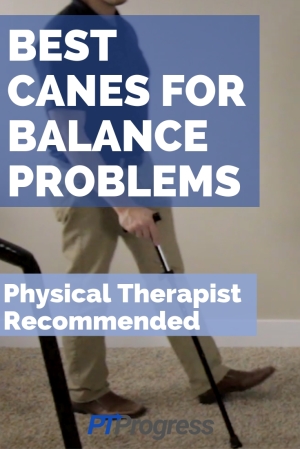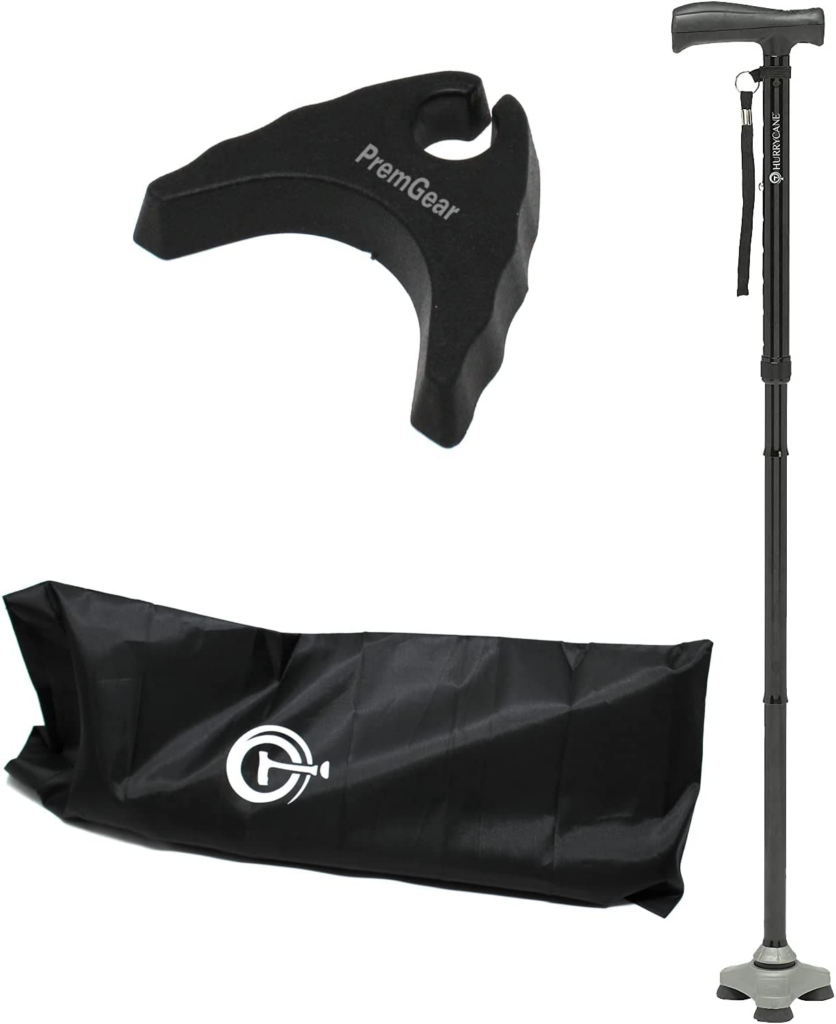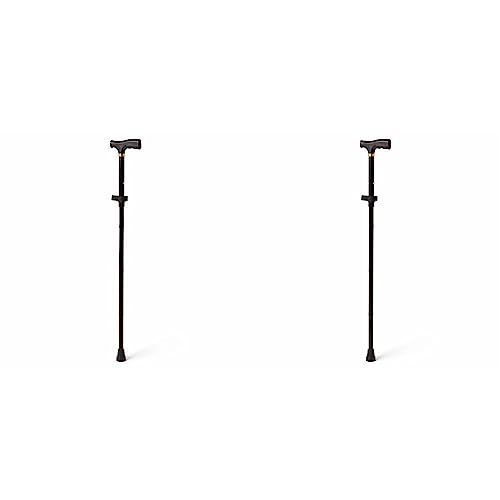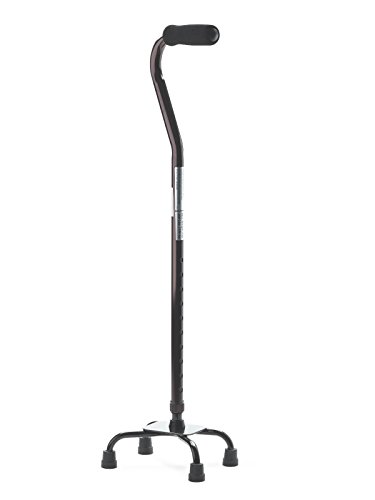
It’s a regular occurrence in the clinic when one of my patients asks “what is the best cane for balance problems?” And it’s a question I love to answer, because not all canes are created equal!
With the right cane, you can significantly improve your overall stability, especially if your balance is “feeling off.” You might also need to use a cane after a knee replacement or surgery.
Because a cane is potentially so helpful for your health and recovery, it’s important that you find the right one.
Using a Cane for Balance Problems
One of the best ways to improve your balance is to use a cane. Some of my patients need a cane for just a short period of time, while others require a cane indefinitely for their balance.
With a cane, you’ll strengthen your balance by adding an extra touchpoint to the ground. This increases your base of support, improving your stability.
Using a cane can also take the pressure off a joint, positively affecting your balance as well.
Why do I lose balance?
Maybe you’re resisting using a cane because you think it’s “old.” There’s a reason why canes are so popular among the elderly; balance issues become more common in old age.
Balance decreases due to multiple factors, many of which correlate with older age, such as the following:
- Decreased vision
- Loss of muscle mass and strength
- Slower reflexes and decreased coordination
- Vestibular system dysfunction
But even if you’re relatively young, you may have poor balance due to muscle weakness unrelated to age or resulting from a surgery.
No matter your reason, a cane can be a good solution for poor balance as you work with a Physical Therapist to restore your strength.
What are the Best Canes for Balance?
When selecting a cane for balance issues, you should keep in mind the following criteria:
A cane should be sturdy, comfortable, and fitted correctly.
Most canes are height-adjustable, comfortably accommodating your standing posture whatever your height.
Otherwise, you can go with a non-adjustable wooden cane. Some people prefer the look and feel of a wooden cane, and so long as it’s the correct height, a wooden cane can provide great support.
What’s the Right Cane Height?
Just because you’re using a cane doesn’t mean you have to hobble around all bent over. In fact, that’s what you shouldn’t be doing! If you’re doubled over when you’re using a cane, then it’s too short.
Conversely, if your cane is too tall, you may end up straining your wrist and compromising your balance.
To find the right height for your cane, stand tall and relax your arms by your sides. Measure the distance from the floor to the crease at your wrist. That’s where the handle of your cane should reach, so that measurement is how long your cane should be.
If the cane handle is taller than your wrist crease, the cane is too high and may cause wrist or elbow pain. If it’s too low, well, you’ll potentially ruin your posture and look much older in the process.
Stability: Single Point vs 4 Point Cane
A standard cane has a single-point base, like a staff. Other varieties of canes include a wider base or a larger “foot” for increased stability.
Don’t be fooled. A cane should be stable throughout; it should not flex like a shock absorber or bend at any point. You’re the one bending and flexing. The cane’s job is to support you.
Is the Hurrycane a good option?
The Hurrycane is one of those canes with a wide foot. It’s designed to meet the ground with three points of contact. While this is good in theory, the problem I have with this cane is its unstable, flexible base. The cane is marketed as an “all-terrain” cane because the base bends and flexes.
Hurrycane claims this cane stands upright, a feature which some people confuse with stability. Remember, a sturdy cane is what you’re after, not a convenient cane.
Should I Get a 4-Point Cane?
If you’ve ever seen a cane with four small legs on it, you’ve spotted a quad cane or a 4-point cane. While a standard, single-point cane gives your body an additional point of contact with the ground, a 4-point cane maximizes that contact and provides significant stability.
These canes take a little practice to use at first. If you’re comfortable using a single-point cane but still struggle to maintain your balance, you should consider a 4-point or quad cane.
Who should use a quad cane?
People use quad canes for various reasons, including:
- Need for greater stability from a single-point cane
- Difficulty coordinating movement after a stroke
- Transitioning from a walker to a single-point cane
Do I really need to use a cane?
If you have difficulty keeping your balance or if there are times when your knee or leg wants to “give out,” you should try using a cane for a while.
Don’t lose heart! You may only need it temporarily while you restore the strength in your leg or improve your balance. Your Physical Therapist can recommend how long to use a cane based on your situation.
Here are some of the best canes, as recommended by Physical Therapists:
Improve your Balance with Physical Therapy
You can put off having to use a cane by improving your balance now. My 21 Days to Better Balance uses strength-training exercise and slow repetition to retrain muscles and improve balance. Check out this printable and start your journey to better balance today!
- Travel-friendly design: The Medline Folding T-Handle Cane's compact and foldable structure makes it ideal for travel, easily fitting into suitcases or...
- High weight capacity: With a robust construction, this aluminum cane can support up to 250 lbs (113 kg), making it suitable for a wide range of users
- Enhanced Stability: The four-footed design of this medical walking cane provides balance and support
- Comfortable Use: The foam handle of this mobility aid ensures a comfortable grip, evenly distributing weight for easy maneuverability
- Enhanced Durability: Constructed from high-quality aluminum, this cane offers superior strength and longevity, ensuring it can withstand daily use and...
- Ergonomic Design: The offset handle provides a comfortable grip






